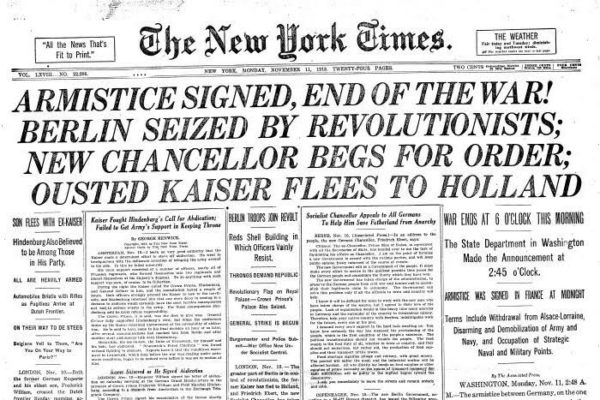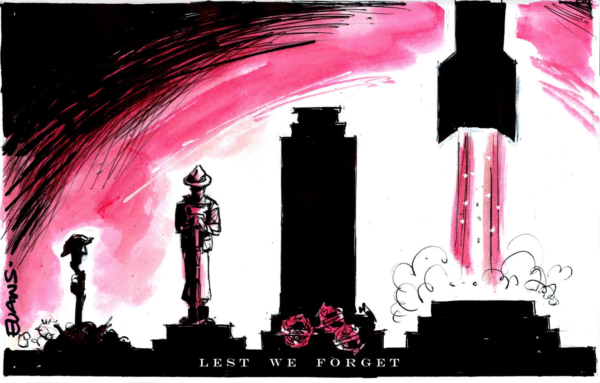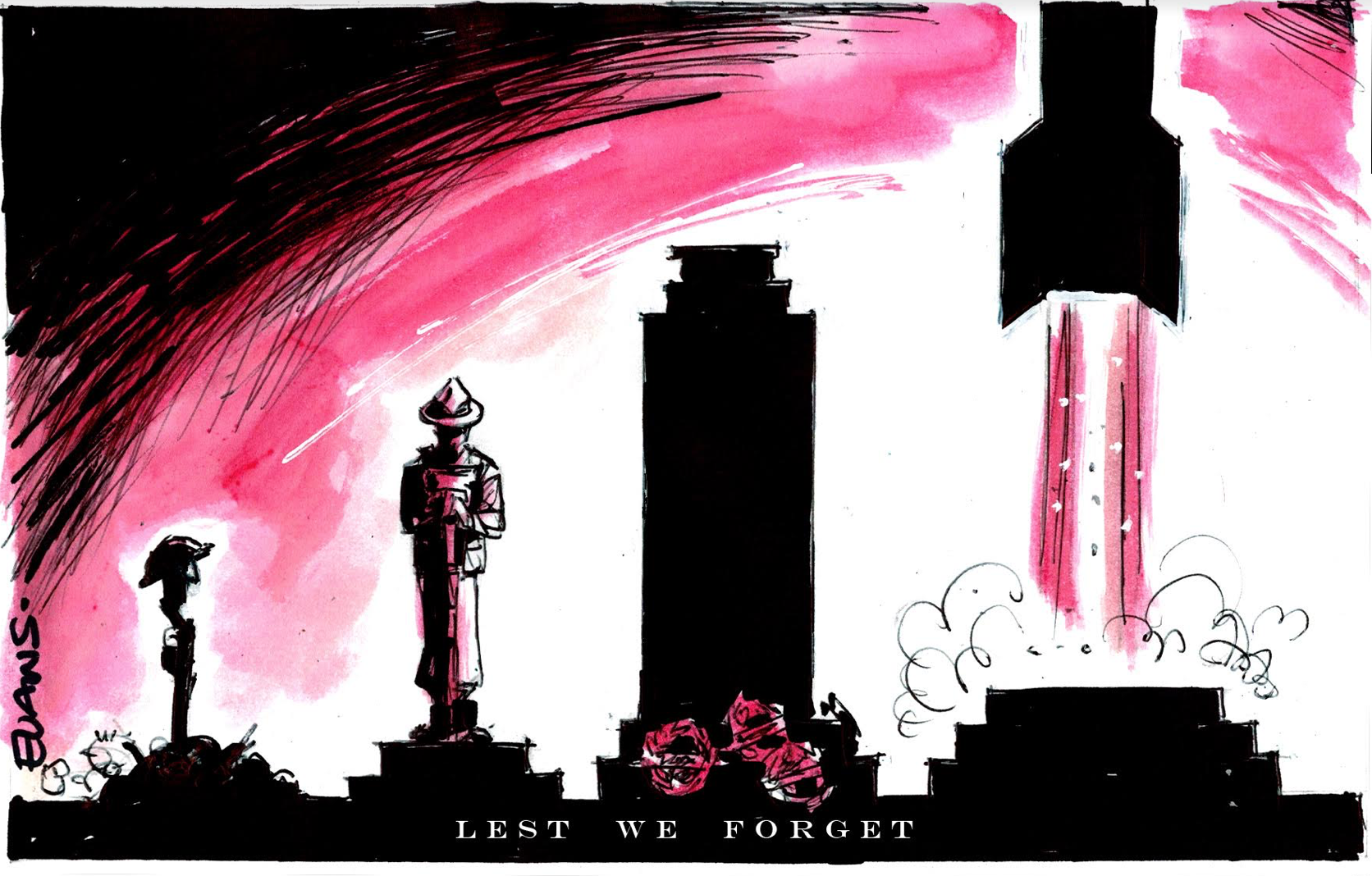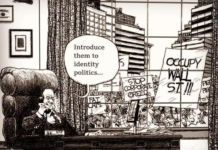
Today we are commemorating Armistice Day. This is the day when the fighting stopped on the Western front in Europe.
As a participant in this lie of the “war to end all wars” New Zealand had achieved the unique result of suffering the highest military casualty rate of any nation involved in that war.
I have written on this little-acknowledged fact previously, but it worth repeating the main points today. At the time New Zealand’s population was a little over 1 million and just over 100,00 men served in war theatres protecting the British “Empire”, hence these threatres included Gallipoli and Sinai-Palestine as well as the slaughterhouses in Europe.
New Zealand casualty rate in that war, killed or wounded, was 58%. That is equal to one-quarter of the adult male population aged between 20 and 45 and eligible to serve. Our death rate of those who served at 16.6% was higher than that suffered by Germany!
“The total number of New Zealand troops and nurses to serve overseas in 1914–18, excluding those in British and other Dominion forces, was 100,444, from a population of just over a million. Forty-two percent of men of military age served in the New Zealand Expeditionary Force, fighting in the Gallipoli Campaign and on the Western Front. 16,697 New Zealanders were killed and 41,317 were wounded during the war – a 58 percent casualty rate.”
Although numbers are difficult to estimate accurately, the German losses are thought to be around 13% of those who served. (see War Losses Germany)
This was because of the utter contempt that the British empire’s officer corps (drawn largely from the more stupid sons of the aristocracy) had for their own working class and peasant troops.
Captured officers from the other side were treated in a far superior manner than those of their own troops.
This war was strongly opposed by the fledgeling Labour Party in New Zealand and some of its leaders were expelled from parliament and went to prison for their stand.
It is also a bit weird that the commemoration is for an “armistice” rather than the actual official end of the war which did not happen until the Treaty of Versailles in 1919.
Most people think that “we” that is Britain and her allies, including New Zealand, defeated the German army in battle. Actually, there was no decisive battle. The German high command sued for peace while still occupying French and Belgian territory because millions of workers and soldiers across Germany had begun to take action against the war and privations that were a consequence of the war. Not only were they striking but they were forming workers, peasants and soldiers councils and raising the red flag upon town halls in city after city across the country. The military high command prevailed upon the Kaiser to appoint the Social Democratic Party leader as Prime Minister in a desperate move to save their own necks (literally and figuratively) from the revolution that was coming their way. The Kaiser was forced to abdicate and a republic was declared. The Social Democratic Party leaders had supported the war when it was declared by the German government unlike the Labour Party in New Zealand which was opposed. They SDP used their new power to help crush the workers uprising that was developing. The revolutionary antiwar leaders of the German workers, Rosa Luxemburg and Karl Liebknecht of the Spartacist League were murdered.
The war came to an end because of a revolution in Germany. Actually, it came to an end as a result of a series of revolutions beginning with the Russian revolution one year previously that overthrew the Czar and the capitalists and aristocrats behind him. The Bolshevik Party leaders of the Russian revolution immediately withdrew from the war and demanded a just peace between all nations without annexations. Working people of the world sensed that this war was not one in their interests. It was a war between capitalist exploiters and imperialist powers to divide and redivide the world in their interests.
The revolutionary antiwar message put forward by the Bolsheviks was hugely popular around the world including with the leaders of the fledgeling Labour Party in New Zealand who founded the party in 1916 in militant opposition to the war and conscription imposed that year. The New Zealand Labour Party was unusual in this regard. Most of the Labour and Social Democratic parties, like those in Germany, the UK and France, had fallen behind “their” own governments when war broke despite many years of campaigning against the war that millions of people sensed was coming before it actually broke.
This war was never a popular war, especially after the first drumbeats of patriotic fervour faded in face of the brutal reality of war. This is why governments were forced to introduce conscription if they could
In Australia despite their Labour Party supporting the war, opposition to conscription was so strong two referendums to introduce it during the war were defeated, in October 1916 and December 1917.
Ireland had revolted in Easter 1916 and then defeated attempts to impose conscription by their colonial masters who were desperate for more fodder to replenish the killing machine after their huge losses.
Scottish Marxist John McLean led the “Red Clysdale” a shipbuilding district in Scotland in opposition to the war and was jailed.
In Canada a week of rioting broke out in Quebec when conscription was imposed in March 1918 and military force was used to occupy and quell the uprising.
In France, there were a whole series of strikes and military mutinies against the war during 1917 that affected nearly half their military battalions. This was crushed only through thousands of court martials and hundreds of death sentences being imposed.
The British army had their own mutinies in 1917, including one featuring New Zealand soldiers at Étaples in France.
A survey in New Zealand in 1915 found 40% of adult males of serving age opposed serving abroad. Thousands actively sought to avoid military service. Many went abroad to Australia or elsewhere where conscription did not apply. Passports were actually introduced in New Zealand at the time to try and stop people leaving rather than assisting their travel. In 1916, when conscription was imposed, 69% of eligible men were not volunteering.
Many Maori who had not so long before been subject to their own brutal wars of empire and had their land confiscated were also opposed. Conscription was extended to Maori males from tribes deemed to be less patriotic in volunteering earlier which deepened opposition still more.
Opposition to conscription was made a criminal act of sedition. And the meaning of sedition was extended to include creating “hostility between the classes”. Strikes which impeded the war effort could be deemed seditious acts.
But it was from the unions and new socialist movement that some of the strongest opposition came. A national conference of 200 organisations opposed to the war was convened by the Federation of Labour in January 1916 to campaign against the proposed conscription law. Five future Labour Party ministers in the 1935 Labour government, including a future Prime Minister Peter Fraser, were jailed for sedition. The others were Paddy Webb, Bob Semple, Tim Armstrong and Jim O’Brien.
This opposition was strongest in the mining towns of the West Coast of the South Island which had elected Paddy Webb to parliament in 1913 representing the Grey electorate which covered Greymouth. Webb opposed National Registration which was a forerunner to the draft in 1915. In that registration, of the 195,000 men who responded, 34,000 said they were unwilling to serve at all, and a further 44,000 said they would not serve overseas. When conscription was introduced he campaigned for the law’s repeal. The first union strike against the Military Service Act was by Blackball miners in November 1916. Waterside workers and miners began a joint go-slow in January 1917 against conscription. When the miners’ leaders were arrested in April all West Coast mines struck to demand their leaders’ release. A speech by Paddy Webb in support of the miners led to his arrest for sedition and a sentence of three months in prison.
Webb was then subject to conscription himself. He refused to submit, resigned his seat and stood again to make it into a referendum on conscription. But the government parties refused to stand a candidate and he was re-elected unopposed. He was then jailed for two years and banned from voting or standing for office for ten years. His seat was declared “vacant”. Another antiwar Labour leader Harry Holland then won the Grey seat for the new Labour Party in April 1918.
There were strong Irish republican sympathies in the mining districts on the West Coast as well which strengthened the opposition to the war. Indignant Protestants debounced Paddy Webb’s original election as an “unholy alliance of socialists and Catholics.”
The world was a tinderbox waiting to ignite. From November 1917 to November 1918 in revolutions were destroying the monarchical empires from Rusia, Austro-Hungary, the Ottoman, Germany as well as Finland, Ukraine, Bulgaria. It seemed a new world was awakening and in fact being formed.
In 1918 Labour Party Leader, Robert Semple, said: “If I were in Ireland, I would be a Sinn Feiner; if I were in Germany, I would be a Sparticist; if I were in Russia, I would be a Bolshevik”.
But that new world did not happen. Capitalist rule was stabilised temporarily, and the world ended up plunged into a world depression, from which fascism and a new world war emerged. Since World War Two, millions more people have died in Korea, Vietnam, Cambodia, Laos, countless other nations in Africa and the Middle East, because capitalism depends on resource extraction. This system must control the natural wealth of the planet and the labour resources of the world for the benefit of a tiny minority of super billionaires who own and control this economy for their private benefit.
That system must be overthrown. We need to go back to the anti-war and socialist ideals of the founders of the labour movement to find a new/old way forward.







To paraphrase Groucho Marx….
“Maybe someone didn’t want to give up the $$ paid for renting the Battlefield”—-Duck Soup
That is a really informative article, Mike. I didn’t know any of that. It has got me thinking that if capitalism depends on resource extraction the whole silly game can be stopped if all the land in NZ was owned by all the people and administered on their behalf by the Government.
This would mean that all the resources within or upon the land could not be extracted without the consent of the Government, which would have to be a partner. It would also mean that the land could not be sold to individuals or private companies and those occupying the land would do so only as long term tenants (99 year leases). This would immediately stop land speculation.
Obviously this idea could not happen over-night but the government would be able to acquire a lot of land right now, which is threatened with inundation and cannot be insured. However houses on such land can be lived in and rented for quite a long time. Speculation on such land would be pointless.
Thank you Mike Treen.
The colonials were cannon fodder under the control of our British Masters?
We did a lot of the dirty work and the fighting for the British ?
Some our British masters were dumb hence why so many died unneccesarily they ( the british masters weren’t fit for purpose)
Time to put ANZAC Day out to pasture. The vast majority of us Kiwis could care less about the failed Gallipoli campaign or ANZAC in general.
There are lots of immigrants here now and they probably rightly don’t care either. Younger Kiwis like myself watch YouTube and skip over the yearly regurgitation of ANZAC articles on news sites.
If it wasn’t for the paid holiday most of us wouldn’t know these ceremonies, which have become a yearly waste of time and money were taking place. The idea of going to a Dawn Ceremony strikes me as pointless.
Glad to report my generation already knows war is bad and sees the “least we forget” line for the propaganda it is! Not interested in being around a bunch of dusty old men who are stuck in the past, using propagandist lines to hoke off velvet puppies.
Do I think NZ history should be taught in schools – absolutely I do! Do I think we should be put through this ANZAC BS every year – HELL NO!!
ANZAC as a public holiday, year commiseration and political wreath laying exercise is now inappropriate – especially considering the amount of immigrants we have and people detached from these outdated events.
Don’t like it, maybe your generation shouldn’t have voted for National .. New Zealand is a very diverse place now – why should we have a public holiday which is only cared about by a small few?
I understand people may find this point of view repugnant, too bad! Yes the Gallipoli campaign happened, must we be banged over the head with it every year!? Perhaps we could recognise it once every 5 years – even once a decade might be enough.
“We Will Remember Them”
Especially those whose families suffered the loss and crippling of men who went to these wars.
We Will Remember Them.
Then teach it in schools! These yearly ceremonies only serve to remind the demented of mind what happened – the few that are left anyway.
Making gun-torrent/cannon fodder out of young men was what resulted from the Gillipoli campaign – get back to me when that is the over arching message, NOT some romanticized fight for freedom!
NZ history is rarely taught in NZ schools and most teachers would be hard pushed to string together a couple of sentences about ANZAC beyond the acronyms meaning.
Try a library, Zack.
And perhaps you could consider telling someone that war is bad.Like the dead. And the living.
Interesting. I’m in Christchurch and I’m dismayed by the state of our Citizens’ War Memorial, located next to Cathedral Square – It sits on a bed of weeds, covered in bird excrement .. while people gloss over the truths of ANZAC history.
The new library isn’t far, that structure which cost tens of millions .. not far from perhaps what was one of the most beautiful war memorials in NZ.
Shameful.
Zack it’s great that you’re a young guy concerned with truth. Go for it. The search could take forever, but it opens new vistas along the way.
We were all lied to at times, but truth is the daughter of time, and it always outs. The truths of Anzac – and WW1- have long been known, but maybe not completely, or by all.
But our dead and our dusty old women and men, by and large believed that they were doing the right thing, and we dishonour them by demeaning their experience.They were good people, and brave, and that’s the bottom line.
If you are able to sustain your belief in the importance of truth, and marry it with kindness, then you could consider a career in politics, where these values are always much needed.
That’s a reasonable call. I’m more calling out the lip-service given to ANZAC day. Many people would vilify me for my above statements, yet the same people would often be wholly ignorant of history.
To me it seems only a small number of people truly care about ANZAC day and our countrymen of old that gave their lives, indeed believing in virtue and valor
I went for a walk up Rapaki hill today, it’s a walking/mountain biking track that runs through a valley, the landscape made me reflect on Gillipoli and those men’s struggles.
When I think about our leaders who’s biggest concern is what to wear to a ‘dawn service’ and whether they have their speech down so as to not trip over their words ..
What a contrast between those wanting to be seen before the people and those whom gave their innocence/lives.
I know it’s not right to impute motives to people’s actions but as the old idiom goes, “the proof is in the pudding”. I see a broken Cathedral, beggars with cardboard signs and our desecrated Citizens’ War Memorial straddling the two.
I use to sit in Cathedral Square as a kid and listen to the Wizard rant and think to myself how lucking we were to have such a grand memorial – a powerful angel with arms lift up and a sword running between them.
A sword of truth perhaps because even in it’s rundown state it speaks volumes.
Be a leader yourself then Zack.
Start your political career by making a reasonable request of the Ch Ch CC to clean up the war memorial.
Inform the media of the issue.
Be prepared for things to come unstuck at this stage.
Stuff, almost certainly won’t publish anything without a large colour photo of you doing something twittish.
You are probably too young to remember when the newspapers were exactly that. Black and white print, with the odd black and white photo.
Then came the big coloured pictures – bigger than comic book pictures – and the news became: a ‘celeb’s’ new house/car/spouse/mouse, utterly irrelevant, but part of an agenda.
Future historians may chart this as the start of the pro-active dumbing down of society. If there is a future.
Don’t be tempted for you and your mates to clean up the memorial yourself. You will almost certainly be breaking some bylaw or ordinance, and find yourself a member of the criminal class without even trying.
You could start a movement for the abolition of television, but it may be too late for that, and you would incur much hatred from the masses, and could make poor oap’s sad. Or maybe not.
kia kaha.
“Ye Hypocrites, are these your pranks
To murder men and gie God thanks
Desist for shame, proceed no further
God won’t accept your thanks for murder.”
Why do we honour murderers rather than real heroes like Archie Baxter and Ian Hamilton?
Thank you Mike. I was (as usual!) ignorant of these underlying factors.
Thanks Mike..could barely process let alone stomach the whitewashed ‘great war’ sacrifice for noble causes and peace in our time nonsense yesterday while catching up on Gaza and Yemen news not covered..
Thankfully a granddaughter also arrived so 11/11/2018 will be a date for honesty and happiness to be celebrated.
The hypocrisy I saw uncomfortably skimmed over while watching Q+A while Hit&Run Inquiry also coughed over by the latest ‘Defence’ drone final straw for me..
Very much enjoyed your article..Will continue to teach fact not fiction and never forget
You’re a treasure Mike , loved seeing you on Waatea 5th Estate, and always find your articles eye opening
In my opinion these Anzac “celebrations” are like mourning the dead of mass shootings in America without demanding gun reform
As one mother cried out”I don’t want any more prayers, get rid of the guns”
In the case of international wars its” get rid of the Mafioso racketeers and profiteers”
enabled by our governments
So the Labour Party was founded specifically as an anti-war movement? Followed by the National Party being founded specifically as an anti-Labour-government movement, just before the first Labour govt was forced to pack us off to WWII. Frustrating irony all round.
“if I were in Germany, I would be a Sparticist”
Lock up your daughters…
Perhaps a worthy read, as this post does not seem to give the whole picture:
https://en.wikipedia.org/wiki/German_Revolution_of_1918%E2%80%9319
The war was more or less lost for the German Empire, after the US stepped in supporting the allied forces in the west, and after the Balkan front also collapsed (Austria-Hungary facing defeat and break up):
“Request for ceasefire and change of constitution
After the victory in the east, the Supreme Army Command on 21 March 1918 launched its so-called Spring Offensive in the west to turn the war decisively in Germany’s favour, but by July 1918, their last reserves were used up, and Germany’s military defeat became certain. The Allied forces scored numerous successive victories in the Hundred Days Offensive between August and November 1918 that yielded huge territorial gains at the expense of Germany. The arrival of large numbers of fresh troops from the United States was a decisive factor.
In mid-September, the Balkan Front collapsed. The Kingdom of Bulgaria, an ally of the German Empire and Austria-Hungary, capitulated on 27 September. The political collapse of Austria-Hungary itself was now only a matter of days away.
On 29 September, the Supreme Army Command, at army headquarters in Spa, Belgium, informed Emperor Wilhelm II and the Imperial Chancellor Count Georg von Hertling, that the military situation was hopeless. Ludendorff said that he could not guarantee to hold the front for another 24 hours and demanded a request to the Entente powers for an immediate ceasefire. In addition, he recommended the acceptance of the main demand of Wilson to put the Imperial Government on a democratic footing in hopes of more favourable peace terms.”
The rebellion of naval forces in Kiel and Wilhelmshaven started the end of the war, speeding up the internal collapse of imperial German forces and institutions.
Rosa Luxemburg and Liebknecht and their USPD party wanted a Soviet style revolution in the end, with workers’ councils and so taking power, and did not want to join the SPD in supporting general elections to a new assembly to be held in January 1919.
They were later murdered by right wing Reichskorps.
Thank you Mr Treen! Very informative and you answered a number of wonderings I’ve often had about that war and the times that followed.
I fully resonate with “That system must be overthrown. We need to go back to the anti-war and socialist ideals of the founders of the labour movement to find a new/old way forward.”
There may have been no decisive battle, but the British and French had figured out how to defeat the Germans and were making steady progress towards doing so. The Germans essentially had no answer to these tactics, which minimised Allied casualties while taking small bites out of the German line. It would have taken some time, but the Germans were in the process of being comprehensively defeated.
His Motherland but not the motherland of land of many Kiwis, In my opinion, these Anzac “celebrations” are like mourning the death of mass shootings in America without demanding gun reform
https://www.timehubzone.com/worldclock
Seems fire is replacing dogs to (re)move the sheep.
https://www.youtube.com/watch?v=rcuwtHIwlSQ&feature=em-uploademail
While we were sleeping WWIII started.
Noone WINS wars except bankers and arms manufacturers.
Maybe it’s time to try and WIN peace.
Comments are closed.